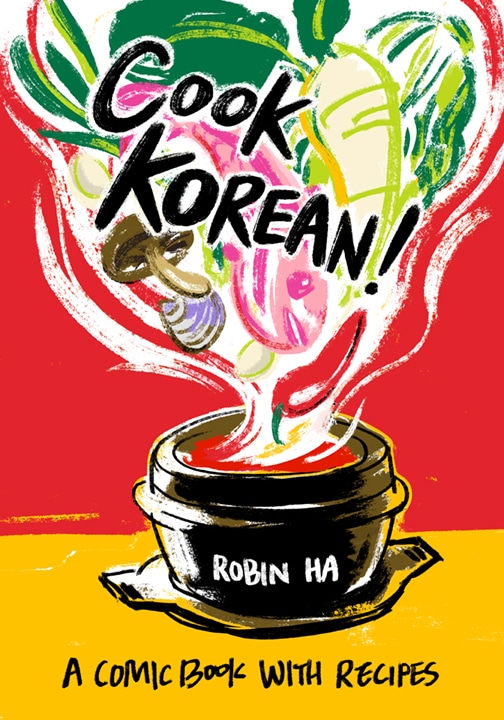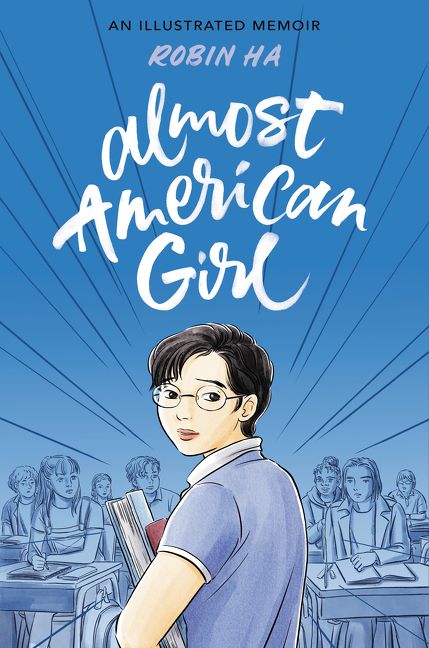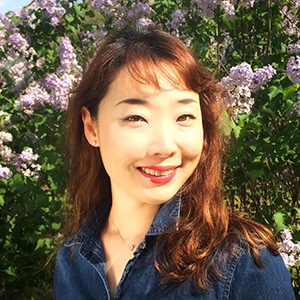Robin Ha is an author and illustrator, whose books include Cook Korean! A Comic Book with Recipes and Almost American Girl. You can find her work at Powell’s, your local bookstore, or your local library. She is interviewed here by APALA member Molly Higgins.
Molly Higgins (MH): Please introduce yourself and briefly describe your literary work and career path to date.
Robin Ha (RH): My name is Robin Ha. I am the author and illustrator for the NYT bestselling cookbook comic book, Cook Korean! A Comic Book With Recipes. I was born in Seoul, Korea and immigrated to the U.S. when I was fourteen. My upcoming graphic novel memoir, Almost American Girl releasing on January 28th, 2020 is about my experience as a young immigrant grappling with culture shock and language barrier and finding a new identity as a Korean American.
MH: Your book Cook Korean! is a comic book with recipes. You introduce readers to ingredients, cuisine types, and recipes. I love that your recipes aren’t overly prescriptive. It really feels like someone is showing me how to generally cook at home, and giving me the free range to be flexible. How did you develop your style?
RH: The idea for Cook Korean! came about when I was working on a story for a friend’s comics anthology which was about taste. I thought comics is a fantastic medium to teach anyone anything, and did a one page comic showing how to make one of my favorite banchan (a Korean side dish). It was a lot of fun to draw, and I started to post one to two page comic describing one Korean banchan recipe on tumblr (https://banchancomic.tumblr.com). I didn’t consciously develop the style for these comics. I just thought about how to show each steps more effectively and clearly.

MH: When you’ve got a long day behind you, what’s your go-to quick dinner?
RH: Fried rice or pasta. They are quick to make and also a great way to clean out your fridge. I always make a lot of rice at once, so I can keep the left over rice in the refrigerator so I can use it later to make fried rice. My favorite fried rice is kimchi fried rice with any kind of left over proteins.
MH: Can you talk about fusion food for a minute? In the US, I think there’s a perception that usually means Asian-influenced food made by non-Asians, or it did until Korean tacos got popular in LA. But that’s not what you’re including as fusion food in your book, where you include things like black bean noodles. How are you defining?
RH: I think of fusion as melding of two or more different culture. And I find Korean food versatile to easily mix with flavors from the other cultures but strong enough to stay Korean. I often mix western ingredients such as cheese, butter and tomato sauce into my mostly Korean meals because they are easier to get in my neighborhood. I don’t think you necessarily have to be any ethnicity to be able to cook any type of food. The ingredients from all different cultures are available in most of the cities in America. It’s all up to the person to be adventurous enough to grab it and see what they can do with it.
MH: We’re always looking for more to read. Who are five authors we should we be reading? Why?
RH: Gene Luen Yang has made several awesome books about Chinese culture, and being a Chinese American. Eleanor Davis and Lynda Barry are great graphic novelists who explore many different topics from being an artist to being a mother. David Mazzucchelli is a legend in American comics who drew Batman: Year One. He also made several independent, literary comics including The City of Glass and Asterios Polyp. Hubert and Kerascoet are my favorite writer and artist team who make mystery and fantasy graphic novels including Miss Don’t Touch Me, and Beauty.

MH: You’re being interviewed by a librarian, for an audience of progressive Asian American librarians. What are your thoughts on libraries, and their place in building diverse communities?
RH: I think the libraries really are the key in building a diverse community. It is one of a few things left that the public of all background can access. It is the last hope for many under privileged youth to discover new genre and subject that can broaden their views of the world. I think it is very important for the libraries to acquire books and media of all genre, including comic book and also organize events where children can meet inspiring authors, mentors and other people in their community who share their interest.
MH: What advice would you give young professionals, especially those from diverse backgrounds, who are interested in a career in writing?
RH: Writing is hard and it requires a lot of resilience from the author to never give up no matter how discouraged they get from the naysayers around them. I am still figuring out how to live as a professional writer, after almost a decade of trying to be a professional cartoonist. It’s a long road and chances are you will struggle for a long time to find your voice and actually succeed in making a living from your art. I think persistence and believing in your own story are the key to becoming a professional writer.
You can follow Robin at:
Twitter/ instagram: @RobinHaART
https://banchancomic.tumblr.com
https://robinha81.wixsite.com/robinha

